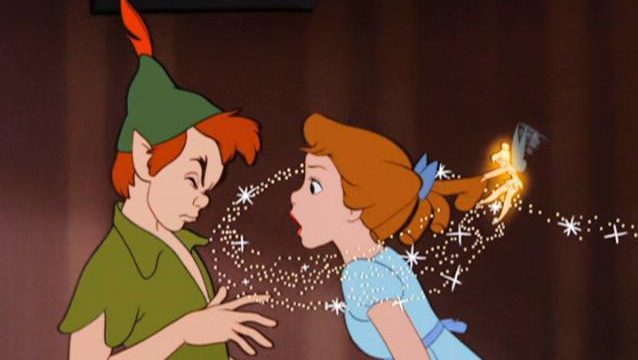Walt was concerned that Peter Pan (Bobby Driscoll) was cold and unlikable, which worried him. However, as was pointed out by experts on J. M. Barrie, author of the original play, that’s perfectly in keeping with Peter Pan. The description of what happens to Lost Boys who grow up actually suggests that he murders them. Basically, it turns out that not growing up makes you a bit of a sociopath. Peter’s not likeable, and he shouldn’t be.
Still, Wendy Darling (Kathryn Beaumont) tells her younger brothers, John (Paul Collins) and Michael (Tommy Luske), stories of Peter Pan. The whole thing frustrates their father (Hans Conried)—they draw a pirate map on his last clean shirtfront and use his gold cuff links as pirate treasure. When his entire family shows more concern over the dog than him, he decides that it’s time for Wendy to grow up and move out of the nursery. When Peter comes to visit that night, he decides to take her to Neverland so she can keep telling him stories about himself. She brings her brothers along.
In Neverland, Captain Hook (also Conried) is desperate to get revenge on Peter, who cut off his hand in one of their battles and fed it to a crocodile, which came away from it with a taste for Hook and now pursues him everywhere. Tinkerbell is jealous of Wendy. The mermaids don’t like her much. Wendy is jealous of Tiger Lily. And deep down, Wendy doesn’t want to be the boys’ mother; she wants to go home to her own (Heather Angel).
Because, crucially, Peter does want Wendy to grow up in the sense that he wants her to be a mother to him and the other boys. He doesn’t like her burgeoning sexuality, though he’s fine with it from Tiger Lily, but Wendy has to be the proper English woman. The fact that she has a crush on Peter is of no interest to him and the subject of resentment from Tinkerbell and the mermaids. She is only useful to him for her nurturing aspects. And Wendy goes along with it until she abruptly doesn’t anymore, because it turns out that existing only to serve sucks.
I mean, we talk a lot about the racism in this—and we should—but it’s also an astoundingly sexist film. Yes, all right, the children are ostensibly being raised by a dog. Which is awful. But the one who’s doing things like telling stories and so forth is a twelve-year-old girl. There’s nothing wrong with the fact that she can already sew; being able to sew at twelve is perfectly fine. But there’s more to the expectations on Wendy than that.
There’s also the fact that the only real feminine interaction we see that isn’t informed by jealousy is that of Wendy and her mother (if you leave out Nana, which you probably should). The mermaids are oddly sexual, flirting with the determined child that is Peter, and their reaction to Wendy is sexual jealousy. As is Wendy’s to Tiger Lily—who gets no lines, and that’s not a “because she was played by a spotlight and a set of bells in the stage play” situation. She just exists to be rescued and to feed Wendy’s jealousy by kissing Peter.
And when Hook uses Tinkerbell to show him where Peter is, he exploits what he thinks of as her feminine nature. He compliments her and wears his “best hook.” That’s kind of sleazy, for a children’s story. Sure, so’s the idea that hunting “savages” or “Injuns” or whatever they’re being called right now is the same as hunting tigers. But that one gets talked about a lot more than the movie’s attitude toward its female characters. Though I suppose it technically passes Bechdel, inasmuch as that fat “squaw” (June Foray) talks to Wendy about women’s work.
Also, there was a Lux Radio Theater presentation of this movie, and I wish I could find the script online. I’d like to see what alterations they made and if they suggest that Wendy should have used Lux Toilet Soap. I found out this week that Lux Flakes were part of Jean Harlow’s hair dye; it’s amazing how Lux is everywhere once you’re looking for it, even today.

